Carl E. Olson's Blog, page 184
November 15, 2012
An Undemocratic Future?
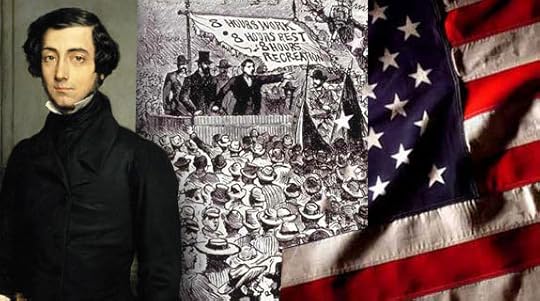
An Undemocratic Future? | James Kalb | Catholic World Report
A review of After Tocqueville by Chilton Williamson
Democracy
means “rule by the people,” but today that seems an increasingly distant ideal.
We live in a diverse country of 310 million people with a government
responsible for a huge range of domestic and foreign concerns. Even full-time
professionals have trouble keeping track of what’s going on. In such a
situation, how can ordinary people exercise much control over public affairs?
But if
democracy can’t really be rule by the people, at least not under present
conditions, what is it? Nobody seems to know, and if someone does no one else
agrees with him. With that problem in mind, Chilton Williamson has written a
book that explores at length the ambiguities, contradictions, and doubtful
prospects of whatever it is that we call democracy.
After Tocqueville: The Promise and Failure
of Democracy (ISI, 2012) is extraordinarily wide-ranging. It starts
with a long bicycle tour of France by a young British historian, which leads to
a discussion of whether the centralized and officially egalitarian France of
today is freer or more democratic than the loosely and locally organized France
that existed before the Revolution. The author then spends the rest of the book
exploring the vicissitudes of the democratic cause, the movements,
institutions, and meanings associated with it, and current conditions that make
its future success doubtful.
In the course
of his explorations Williamson touches on a huge variety of thinkers who have held
quite divergent views on the nature, value, and prospects of popular rule. He
focuses especially on Alexis de Tocqueville, the great prophet and analyst of
democracy in America. Tocqueville was a French nobleman who was truly at home
only with other aristocrats. He nonetheless saw America as a sign of the
inevitable triumph of democracy throughout the West, and was public-spirited
and cosmopolitan enough to recognize that the new order would have certain
advantages.
Tocqueville
was concerned to secure the advantages of democracy and minimize its dangers,
but his confidence in its approaching triumph was not matched by confidence it
would endure.
November 14, 2012
New Books, Films, Music and Sale items starting at 20% off!

New Books, Films, Music and Sale items starting at 20% off!
New releases are available just in time for the Christmas season! The Ignatius Press/Magnificat books 24 Christmas Stories for Little Ones and Prayers Around the Crib
are excellent books to help prepare your young children for Christmas.
Other great gift ideas include new books by Fr. Baker and Thomas Howard.
For the movie lover, the newly released movie on the life of Saint Barbara
is an inspiring film you won't want to miss! And don’t forget to get
your copy of Susan Boyle’s new album of famous stage songs. It’s sure to
be a winner!
Check out our sale below the fold Dozens of titles including books by Pope Benedict
XVI, novels, and art books at unbeatable prices are sure to make great
Christmas gifts. Click here for the full listing.
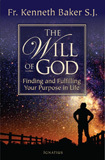 The Will of God
The Will of God
Finding and Fulfilling Your Purpose in Life
Fr. Kenneth Baker
This book provides the modern reader with guidance on how to reach
intimacy with God and happiness with him forever by bringing one's life
into conformity with his will. The book consults many sources-the
Bible, the teachings of the Church, and the lives of the saints-and in
all three the formula is the same: Obey God in all things. Also available as an e-book.
Regular price: $16.95, sale price: $13.56
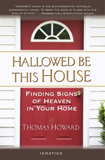 Hallowed Be This House
Hallowed Be This House
Finding Signs of Heaven in Your Home
Thomas Howard
Thomas Howard shows us that every room of your house-the living
room, the kitchen, the bedroom, and even the bathroom-is a holy place
where God's grace awaits you, if only you know how to recognize His
presence there. Also available as an e-book.
Regular price: $14.95, sale price: $11.96
 24 Christmas Stories for Little Ones
24 Christmas Stories for Little Ones
Sophie de Mullenheim et al
Prepare your young children for Christmas by reading aloud these
delightful and inspiring stories. Familiar customs such as the Advent
wreath and the Christmas tree, as well as traditions from other parts of
the world, are woven into charming stories with colorful illustrations.
Regular price: $14.99, sale price: $11.99
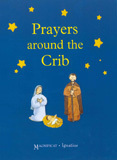 Prayers Around the Crib
Prayers Around the Crib
Juliette Levivier
A joyful book for young children preparing for Christmas, which
explains the meaning of the Advent season with its special calendar and
wreath, the Christmas tree, the various figures of the Nativity scene
including the angels, shepherds, the three Kings, Mary, Joseph, Jesus
and more.
Regular price: $9.99, sale price: $7.99
Jesus of Nazareth: Holy Week
Pope Benedict XVI
What happened in the final week of Jesus of Nazareth's earthly
life? In Jesus of Nazareth: Holy Week: From the Entrance Into Jerusalem
to the Resurrection, Pope Benedict takes up that and other crucial
questions. Also available as an e-book and audio download.
Regular price: $24.95, sale price: $12.50
Also available:
Jesus of Nazareth Study Guide
Regular price: $7.95, sale price: $3.95
Charity in Truth
Caritas in Veritate
Pope Benedict XVI
Charity and Truth was expected to be—and is—the Pope's
encyclical on "social justice." And indeed "justice" and "rights" find
their proper place. But "charity" and "truth" are shown to be the
fundamental principles. Also available as an e-book and audio download.
Regular price: $14.95, sale price: $7.50
Poor Banished Children
A Novel
Fiorella de Maria Nash
An explosion is heard off the coast of seventeenth-century England,
and a woman washes up on the shore. She is barely alive and does not
speak English, but she asks for a priest . . . in Latin. She has a
confession to make and a story to tell, but who is she and from where
has she come? This historical novel raises challenging questions about
the nature of courage, free will, and ultimately salvation. Also available as an e-book and audio download.
Regular price: $16.95, sale price: $8.50
Extreme Makeover
Teresa Tomeo
Packed with not only persuasive statistics but also powerful
personal testimonies, Extreme Makeover shows that it is not the slogans
of the sexual revolution and the women's liberation movement that free
and dignify women, but the beautiful teachings of the Catholic Church. Also available as an e-book and audio download.
Regular price: $21.95, sale price: $10.98
The True Icon
Paul Badde
In this lavishly illustrated book, best-selling author Paul Badde
sets out on a journey through Europe and the Holy Land as he traces the
rich history of the Shroud. With the investigative skills of a seasoned
journalist, Paul Badde uncovers many of the mysteries surrounding the
Shroud and also researches another relic honored as a burial cloth of
Christ-the Veil of Manoppello, which bears the image of the Holy Face. Also available as an e-book.
Regular price: $22.95, sale price: $11.50
Max and Benedict
A Bird's Eye View of the Pope's Daily Life
Jeanne Perego
This lovely illustrated book for children (of all ages!) is a
sequel to Joseph and Chico, the international best-seller that told the
story of the life of Pope Benedict XVI from his youth through his
election as the Pope. With the same award-winning author and
illustrator, this lavishly illustrated book is aimed at children but in a
way that even adults will enjoy. Also available as an audio download.
Regular price: $17.95, sale price: $8.95
Films
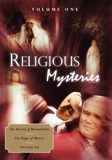 Religious Mysteries Volume One
Religious Mysteries Volume One
This new documentary film series presents investigations into
intriguing mysteries connected with the stories and history of famous
Catholic saints, apparitions, Popes, and holy places, and some amazing
findings from these studies. This DVD includes three separate films: The
Secret of Bernadette, The Pope of Mercy and The Lost Ark.
Regular price: $24.95, sale price: $19.96
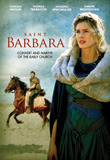 Saint Barbara
Saint Barbara
Convert and Martyr of the Early Church
Saint Barbara is the story of the daughter of Dioscoro, the Roman
governor during a time of fierce Christian persecution. Barbara
valiantly attempts to save a slave named Giuliana, as well as other
Christians being persecuted, boldly protesting to her father and other
government leaders. It is also the story of her profound love for
Claudio, the noble Roman soldier whose life she saves, as well as her
deep compassion for all afflicted humanity.
Regular price: $19.95, sale price: $15.96
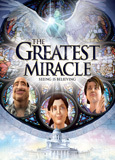 The Greatest Miracle
The Greatest Miracle
From the Producer of For Greater Glory, this is a
beautiful, animated story about the power and impact of the grace of
God, and of unseen spiritual influences and events, in our lives,
especially in Church during our participation in the Holy Sacrifice of
the Mass.
Regular price: $14.95, sale price: $11.96
 Saints and Soldiers: Airborne Creed
Saints and Soldiers: Airborne Creed
From the producers of the best-selling, award-winning movie Saints and Soldiers and based on actual events, Saints and Soldiers: Airborne Creed tells
the action-packed story of three World War II U.S. Army
paratroopers-Rossi, Jones, and Curtis fighting desperately to fulfill
their mission against seemingly insurmountable odds.
Regular price: $24.95, sale price: $19.96
The Perfect Game
The incredible true story of the underdog foreign Little League
team who inspired two nations. Cesar returns to his native Monterey,
Mexico after his major league career is cut short. A group of
impoverished, baseball-loving kids recruit him to coach their rag-tag
team. The parish priest teaches the boys to always trust in God and his
providential help, and their Catholic faith inspires the youngsters to
beat the odds and overcome many hardships and bigotry to compete in the
1957 Little League World Series.
Regular price: $19.95, sale price: $15.96
Eggsploitation
A Hidden World
The infertility industry in the United States has grown to a
multi-billion dollar business. What is its main commodity? Human eggs.
Produced by The Center for Bioethics and Culture (Lines That Divide,
2009), Eggsploitation spotlights the booming business of human eggs told
through the tragic and revealing stories of real women who became
involved and whose lives have been changed forever.
Regular price: $16.95, sale price: $13.56
Reality Check
The Four Last Things
Fr. Wade Menezes, C.P.M., presents the Catholic Church's doctrine
and teachings about the Four Last Things: Death, Judgment, Heaven, and
Hell. Filmed in the glorious Chapel of Divine Mercy in Auburn, Kentucky,
home of the Fathers of Mercy, this series emphasizes the importance for
us to strive to be "eternity minded" as we live our daily lives.
Regular price: $19.95, sale price: $15.96
Saint Margaret Mary and the Sacred Heart
Told in her own stirring words, St. Margaret Mary's story is a
love story between the little 17th century nun and Jesus Christ, summed
up in the message from Christ that she popularized, of the ardent desire
God has for every soul: "Look at this Heart which has loved men so
much, and yet men do not love Me in return. Through you My Divine Heart
wishes to spread its love everywhere on earth".
Regular price: $19.95, sale price: $15.96
Living the Discerning Life
The Spiritual Teaching of St. Ignatius of Loyola
St. Ignatius Loyola designed the Spiritual Exercises over 450 years
ago, to help retreatants discern those influences arousing
discouragement and deception in their spiritual lives. Fr. Timothy
Gallagher, O.M.V. devotes this 10-part series to those same 14 rules of
Ignatius, more relevant today than ever before.
Regular price: $39.95, sale price: $31.96
The Divine Mercy Chaplet for Kids
Engagingly animated, this program features St. Faustina teaching
her four young friends about the Divine Mercy devotion and how to pray
the Chaplet. Covers such topics as the origins of the Divine Mercy
devotion, the value of sacrifice, the importance of the Sacrament of
Confession, and much more.
Regular price: $9.95, sale price: $7.96
Music
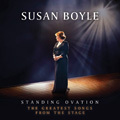 Standing Ovation
Standing Ovation
Greatest Songs of the Stage
Susan Boyle
Singing sensation Susan Boyle returns with a stunning album of
songs from the golden era of film and stage. Her favorite songs are
fused with her outstanding vocals from the ethereal to the dramatic,
showcasing the voice the world fell in love with. Featuring breathtaking
renditions of Bring Him Home and Send in the Clowns and 9 other gems.
Regular price: $15.95, sale price: $12.76
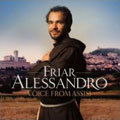 Voice from Assisi
Voice from Assisi
Friar Alessandro
After years of searching for "The Next Great Italian Tenor",
Universal Music surprisingly discovered an amazing young Franciscan
Friar, Alessandro Brustenghi, who lives in the same friary founded by
St. Francis of Assisi. this unique and inspirational sacred hymns album
truly combines the best of the old (or ancient) and the new, featuring
such classic hymns as Panis Angelicus, Tantum Ergo plus 9 other hymns.
Regular price: $15.95, sale price: $12.76
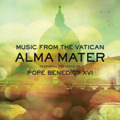 Alma Mater
Alma MaterSongs & Prayers to Mary
Pope Benedict XVI with the Vatican Choir
This unique and amazing new recording features Pope Benedict
singing or reciting hymns and prayers to Our Lady accompanied by The
Vatican Choir. His Holiness uses several languages in this recording
including Latin, Italian, French, all recorded at St. Peter's Basilica
or during his Papal trips abroad. 8 hymns total.
Regular price: $12.95, sale price: $8.95
 David Garrett
David Garrett
David Garrett's unique, and wholly individual style as a renowned
violinist, pays as much homage to popular music as to Mozart and Bach.
He covers an incredibly diverse selection of repertoire, representing
his love for many genres, and the ability to tackle each successfully.
14 songs total.
Regular price: $15.95, sale price: $11.16
Catholic World Report
The Vampire State
by Anthony Esolen

Just loosen your collar� this will all be over in a moment.
The Vampire State likes blood. More than one million unborn children in
the United States every year shed their blood to keep the Vampire State
alive. The Vampire knows well: if human life is sacred, then the sexual
union of man and woman, which brings life, must also be sacred. If that
union is sacred, then marriage is sacred. If the sanctity of marriage
is upheld, then it is possible �just possible �that healthy and
independent communities will be born. In such communities, the Vampire
is not welcome. No, the Vampire will shed a little tear or two, and then
consume the blood. Eventually the Vampire will get around to
manufacturing
Homiletic & Pastoral Review
The Homosexually-Oriented Person and the Church
by Steven Schultz

Despite the �glamorization� of homosexuality in modern society, we do
not serve the good of our fellow man by encouraging this approach.
Sacred Scripture clearly teaches that God does not condone homosexual
acts. 1 Consequently, the Church has consistently taught that homosexual
acts are a violation of Catholic sexual ethics. 2 Unfortunately, those
who advocate such acts attempt to ridicule orthodox Church teaching by
misstating authentic Church teaching as condemning not simply acts, but
homosexual persons themselves. Holding that all persons are created in
the image and likeness of God, the Church most certainly does not
condemn homosexual persons. The Church condemns using human sexuality
for purposes contrary to that for which it is divinely intended, which
includes engaging in homosexual acts. We must understand it is the act,
not the person which is the issue. Let us considers this point in
further detail.
40% off Lisa Becerra's "Employee Pick of the Week"

40% off Lisa Becerra's Pick of the Week*
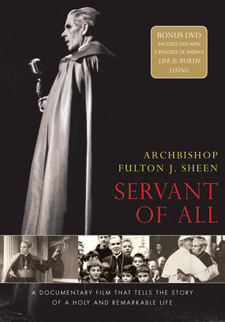 My Pick for this week is the DVD Archbishop Fulton Sheen: Servant of All
My Pick for this week is the DVD Archbishop Fulton Sheen: Servant of All"Wow!" is the first word that comes to mind, what a full life he led!
This film gives you personal stories not told in any of his books, as
well as behind the scenes secrets that made him strive to keep doing
more. Soon after you watch this, you will want to get your hands on
everything he has ever written and listen to all of his audio programs.
Archbishop Sheen has the gift to capture your attention, draw you in and
awaken your sleeping conscience. Since seeing this film, I personally
campaign in spreading the cause for his Canonization.
His
talks, though they were given years ago, are very relevant in today’s
society. His profound words are a message of hope for all.
 Lisa Becerra, a native to Wisconsin,
Lisa Becerra, a native to Wisconsin,works in the Wisconsin office and is a Retail Sales Account Manager at
Ignatius Press. She is married to John and they have six children. In
her spare time she enjoys Teaching 8th Grade CCD, reading,
scrapbooking, cooking, playing fantasy football, working on family
history and tracing genealogy and cheering on her beloved Packers.
*Employee
Pick of the Week program features savings of 40% off a book, movie, or
compact disc personally chosen and recommended by an Ignatius Press
employee.
The Council and the Laity

The Council and the Laity | Russell Shaw | Catholic World Report
The teaching of the Second Vatican Council concerning the laity was an enormous and lasting achievement. But there is much work to do.
A revolution in the
Church’s thinking and practice regarding the Catholic laity has been underway
for the past century or more. This striking development in theology and
pastoral policy received by far its biggest boost up to now from the Second
Vatican Council, although the development itself actually began well before
Vatican II, and its full scope and significance have yet to appear.
An incident from
the early 1950s helps set the Council’s contribution in historical context. At
the time, I was attending a Catholic high school for boys run by a religious
order whose members worked hard to attract promising students to the
priesthood, especially as priests of that particular order.
In those halcyon
days of plentiful clerical vocations, these efforts often met with success. I
wasn’t attracted myself, but a number of my friends and classmates went from
high school straight into the seminary. Some became priests and have
persevered, and some did not.
I take it for
granted that similar efforts to recruit for the priesthood and religious life
also were going on back then at other Catholic schools. Why not? I hope it’s
still like that. But at my school and, I suspect, many others, another form of
recruitment—for the lay apostolate—was also underway.
In those years we
students were strongly encouraged to attend a week-long program called the
Summer School of Catholic Action run by the Jesuits at Fordham University in
New York and other Catholic college campuses around the country. In the summer
between my junior and senior years, I talked my parents into letting me go. I
wasn’t as keen on Catholic Action as on seeing New York, but together with
several hundred other boys and girls from Catholic high schools up and down the
East Coast, I took in enough of the program that week to get the message.
As best I recall it
now, the message was something like this:
November 13, 2012
We need your help to keep Catholic World Report online

The previous version of this email contained broken links - these have been fixed. To donate to CWR, please click here. Thank you, and our apologies for the inconvenience!
In the last year, CWR has brought you twice the value of a yearly print subscription—for FREE!
Dear CWR Reader:
When I took on the
responsibilities of editor for Catholic World Report, I wrote that I did
so “with a mixture of trepidation and optimism: trepidation because I
am keenly aware of the standard of excellence that CWR has maintained
for two decades, and optimism because I think CWR has much to offer its
readers in the years to come, and I believe the Internet provides a
means of responding to events and news with a flexibility and immediacy
not always available with print.”
I further noted that the usual
print edition of CWR, which was published from 1991 to 2011, contained
nine or ten feature articles, interviews, and book reviews, along with
editorials, short news pieces, and a column or two. We intended, going
forward with an online-only CWR, to post two or three features a week,
along with regular blog posts and news briefs.
And all for free, available online all day, every day.
I’m happy to say, eleven
months later, that those expectations have been met and exceeded. Since
January 2012, almost 200 feature articles, interviews, reviews, and
essays have been posted on the CWR site. And that number does not
include the hundreds of posts on the CWR blog, many of them
feature-length, written by the CWR staff and several of CWR’s regular
contributors.
In other words, in terms of content, CWR has been posting two full print editions worth of content every month!
While some readers miss the
print edition, the response these past few months to CWR online has been
overwhelmingly positive and encouraging. And traffic to the CWR site
has increased every month, which indicates that CWR does indeed have
much to offer readers in the months and years to come.
However, CWR needs your help
in order to continue providing high-quality news features, interviews,
and much more. Yes, eliminating the print edition of CWR reduced some
costs. Frankly, it saved CWR. But offering the magazine online for
free—without subscription revenue—also has costs. In order to
compensate contributors, to improve and expand the CWR website, and to
pursue new initiatives to make CWR even more effective, I am asking you
to consider donating to CWR.
I know how tough times are.
And I know that not everyone can support CWR financially. That said, I
strongly believe CWR is worthy of support; I think it provides a
valuable service, presenting Catholic news, analysis, and commentary
from a serious and orthodox Catholic perspective.
A yearly subscription to the print edition of CWR was $40.00. Perhaps you could donate that amount to CWR today. Or $20, $10, or $5. Or $100, $200, or $500. Whatever you can do will help! CLICK HERE to donate to CWR.
Please know that all of us
at CWR value your support—financial, moral, or spiritual support. And
please know that CWR will continue to pursue
excellence in writing and reporting, reviewing and editorializing, all
for the sake of the truth, the Gospel, and the Church of Christ.

Pax Christi,
Carl E. Olson
Editor,
Catholic World Report

Like on Facebook

Follow on Twitter

Forward to a Friend


"Skyfall" or "Skyfail"?
by Carl E. Olson | Catholic World Report
Last week was a momentous one for the world. No, not because of the U.S. elections, but because news broke that the Pope is a big James Bond fan. Or something like that. Or not even close. It depends, I suppose, on how must stock you put in the approach taken by big newspapers to the "news" that the L'Osservatore Romano had no less than five pieces about the most recent installment in the Bond franchise. The headlines are both breathless and comical: "New James Bond film gets five-star Vatican blessing" and "The Pope 'Approves' Of New Bond Flick, Skyfall (Despite all that sex and alcohol)". And so forth. Reuters reported:
"Skyfall" gets a rave review in l'Osservatore Romano, which calls it one of the best of the 23 James Bond films made over the past 50 years.
In the main article, titled "007 License to Cry," the newspaper says the latest incarnation of the world's most famous spy is a rather good one because it makes him less of a cliché, and "more human, capable of being moved and of crying: in a word, more real". A second article compares the different actors who have played James Bond, from the original Sean Connery to the current Daniel Craig.
In an interview with the newspaper, Craig says he feels "very different" from the actors who have preceded him in playing Bond but does concede that Connery is "a point of reference".
I'm not a Bond buff; I don't own any of the films and I've only seen about fourteen or fifteen in all. However, I actually read some of Ian Fleming's Bond novels when I was a kid, and when I finally saw some of the Bond films, I was a bit put off by the disconnect. The Bond of the novels is more raw, less glamorous, and often downright nasty. The books are decidedly dark, especially compared to some of the Roger Moore-era movies. Craig has, in my non-Vatican-endorsed opinion, brought the character much closer to the books. Of course, since no one reads anymore, it's a moot point.
November 12, 2012
Secular Witch Hunts and Post-Modern Fairy Tales

Secular Witch Hunts and Post-Modern Fairy Tales | Michael Coren | Catholic World Report
Activist attempts to destroy the reputation of Dr. Mark Regnerus are not the exception, but the norm.
Well, that puts an end to any doubts anybody had at any time
that there was anything wrong with same-sex marriage. “Study:
Teens With Lesbian Mothers Do Better In School, Happier In Life"
screamed a headline from, all of all places, CBS Les, er, Las Vegas. “Teens
living in homes with lesbian mothers are proving to be more successful in
school and generally happier in life” the article said. “A new study has found
that 17-year-olds with lesbian mothers had high school GPAs ranging between
A-minus to B-plus, while having strong family bonds with their mothers, whom
the teens consider good role models.” The piece went on to describe how the
teens in the study feel connected to their families, admire their parents, and
are models of young people. The principal investigator jubilantly explained,
“As a psychiatrist, I can say that these are the types of child-rearing
outcomes that every parent hopes for.”
So, that—as they say—is that. But hold on just one little
moment. First, the psychiatrist and lead investigator in question is one
Nanette Gartrell, a noted lesbian
activist, who has co-edited a book titled, Everyday Mutinies: Funding
Lesbian Activism. She is
“married” to Diane "Dee" Mosbacher, described as “a lesbian
feminist who has directed or produced nine documentary films, each having to do
with LGBTQ or Women’s Rights issues.” The research, or what passes for
research, was published in the Journal of Homosexuality (and is
available online in PDF format), “covering research into sexual practices
and gender roles in their cultural, historical, interpersonal, and modern
social contexts.” In other words, both the person conducting the study and the
journal publishing the results are agenda-driven, radical, and committed to
propagating the idea that homosexuality, homosexual marriage, and homosexual
parenting are all perfectly acceptable, and perhaps even preferable to their
heterosexual alternatives.
People are allowed to be odd and misleading in a free
society, but it is one of the duties of a responsible media to question or
perhaps even dismiss the work of such people. Instead, one of the largest
networks in the world, CBS, took this nonsense as being revealed truth, and
disguised as fact something that is utter nonsense.
Compare this to how a far more serious and credible study of
the same issue was treated when its results revealed fundamentally different
results. In early 2012 University of Texas sociology professor Mark Regnerus published
a paper in the July 2012 edition of the journal, Social Science Research. He has a Ph.D from the University of North
Carolina, has spent more than a decade in academic research, and has written
two positively and peer-reviewed books. So, Regnerus is no fringe player.
November 11, 2012
St. Martin of Tours and the Search for Holiness

Saint Martin and the Search for Holiness | Régine Pernoud |
Prologue to Martin
of Tours
November 11 is now a red-letter day on the French civil calendar: in 1918
that date marked the end of the slaughter that was the First World War.
But even before France was called France, that date, the eleventh of November,
had been a date on the calendar used throughout Christendom because it
commemorated the burial at Tours of the amazing individual whom we call
Saint Martin.
 He
He was an amazing and even a paradoxical man: he never accomplished what
he had hoped to do, and yet his accomplishments surpassed all possible
expectations. To begin with, this man, who had always tried to go unnoticed,
enjoyed extraordinary popularity. He wanted to be a hermit, to flee the
world and devote himself to ascetical practices; instead he was constantly
surrounded by people, during his lifetime and after his death: the pilgrimage
shrine of Saint Martin in Tours was once the most important after the
three great pilgrimage sites of Christianity, Jerusalem, Rome, and, later
on, Saint James of Compostela. He is remembered as a soldier, and indeed
he was one, albeit entirely against his will. He had refused to be ordained
a priest, considering himself unworthy, and yet he became a bishop. He
had fled the world and sought a life of seclusion, but instead his biography
was written while he was still living!
Thanks to those who discerned the extraordinary qualities in this rather
reticent, unassuming man who resolutely practiced poverty, we know the
story of his life. It spans the fourth century, in which the Church became
free at last to live above ground, only to be torn by dissension so widespread
that it almost brought her to ruin.
There are not many individuals whose biographies were written during the
fourth century, especially during their lifetime. This was the case, however,
with Martin of Tours, thanks to his friend Sulpicius Severus, who survived
him long enough to record for us also the story of his death. And so we
have the unusual good fortune of possessing a contemporary document to
tell us about a man who, throughout his life, sought only to live among
his peers, in obscurity.
In Search of Holiness
Sulpicius Severus was handsome, young, and rich. He lived in Bordeaux,
a particularly prosperous town in the fourth century, where he received
an outstanding education; he practiced law there and excelled in his profession
because of his great eloquence. His family belonged to that Gallo-Roman
aristocracy which enjoyed the favor of the Roman emperors because their
power depended upon it. Thus, in the region that would later be called
Aquitaine, there were several families that owned enormous estates and
a large number of slaves and were extremely wealthy. The province was
crossed by navigable waterways, which guaranteed abundant commerce. Bordeaux
at that time had the reputation of being an "intellectual" city; like
Toulouse, it had quite a number of citizens who had conformed completely
to the customs and tastes characteristic of the Roman Empire. In the region
surrounding Toulouse archeologists have found as many busts and sculptures
from the imperial era as they have in the vicinity of Rome–artwork
intended to ornament the villas where these opulent families lived.
Sulpicius Severus, being a lawyer, had made a name for himself in "upper-middle-class"
circles while he was still a very young man. His reputation is inseparable
from that of the man who would later be called Paulinus of Nola, with
whom he was bound by ties of friendship. Paulinus, a lawyer like Sulpicius,
came from an even richer family than his and was likewise an avid man
of letters. It is easy to imagine the two friends going together to the
thermal baths or attending the literary gatherings of the day, where people
discussed the poetry of Virgil or Ovid, or perhaps the eloquence of Cicero.
Paulinus, who was highly valued by Emperor Valentinian II, had been appointed
for a time as governor of Campania, but he had resigned from his official
duties and returned to Bordeaux so as to lead there a life of elegant
leisure, as was the fashion then on the banks of the Garonne River.
Now a new factor came into his life around the year 389 (Paulinus was
about thirty-six years old at the time): he was touched by the gospel.
The Christian religion, which had been spreading freely for a good sixty
years–the Edict of Milan promulgated by Constantine, which ended
the persecutions, dated back to the year 313–would thoroughly transform
that pleasure-seeking aristocrat. In the year 390, together with his wife,
Therasia, he received baptism. His encounter with the Christian faith
may have been fostered by the great sorrow he had experienced at the death
of a beloved brother.
Soon afterward, Sulpicius in turn was touched by grace. He had been married
only a little while, and perhaps his motherin-law, Bassula, who was a
fervent Christian, had had some influence upon him. He received baptism,
but his wife died shortly after, and he found himself disowned by his
father, who could not abide his conversion. Moreover, Sulpicius himself
was preparing to follow the example of his friend Paulinus, who had begun
to divest himself of all his property, following the evangelical counsel
of poverty to the letter. Of what he inherited from his wife, Sulpicius
kept only a small lot, a kind of temporary lodging, where from then on
he would welcome a number of other Christian converts who wished to lead
a life of prayer and asceticism. The place was called Primullacum in Latin,
and it has been identified with the little city of Alzonne on the road
from Toulouse to Carcassonne, not far from Brain, in the Aude in Languedoc.
Sulpicius must have taken up residence there in 394 or a little earlier.






It was there, too, that he received the letters that
Paulinus wrote to him. For example, the one in which he expresses, in
the rather emphatic language of that era, his admiration for his young
friend:
But you, my most beloved brother, were converted to the Lord by a
greater miracle [than I]. For you were closer to your prime, you were
winning greater eulogies, the burden of your inheritance was lighter,
yet you were no poorer in store of wealth; you were still prominent in
the fame of the forum which is the theatre of the world, and you held
the palm for glory of eloquence. Yet with a sudden urge you shook off
the slavish yoke of sin, and broke the deadly bonds of flesh and blood.
Neither the additional riches brought by your marriage into a consular
household nor the easy tendency to sin after your marriage [i.e., after
he was widowed] which followed your celibate youth could draw you back
from the narrow entrance to salvation, from the steep path of virtue to
the soft, broad road trodden by many. [1]
And Paulinus continues, recalling the friendship that united them in their
youth:
What shall I render to the Lord for this grace in addition to all
his bounty to me? (Ps 115 [116]:12). For through this grace He has
joined you to me not only as a most beloved friend in our earlier life
in the world, but also as an inseparable companion and partner in the
spiritual brotherhood of His affairs.... [T]hat intimate friendship of
our earlier life, when we still loved the things which we now reject in
Christ, marked us out for each other in the love of Christ. [2]
Paulinus had returned with his wife to Campania, where he settled at Nola,
a little town founded of old by Saint Felix, who was buried there. From
then on Paulinus and his wife led a very austere life, dwelling in the same
house but living as brother and sister, and devoting themselves to the needs
of the pilgrims and the poor. Paulinus had already been ordained a priest
in Barcelona, and in 409 he was appointed bishop of Nola. In another one
of his letters to Sulpicius he writes: "You revealed the increase of your
inheritance amongst the saints. This you did by your wholesome disposal
of the burdens of this world, for you have purchased heaven and Christ at
the price of brittle worldly goods," [3] Thus the correspondence between
the two friends leaves no doubt as to their complete conversion, which led
both of them to give away their fortunes. It is said that even Sulpicius,
who retained his ownership of Primuliacum, only did so in order to host
friends there, as well as his mother-in-law, with whom he maintained close
ties of friendship and whose fervent faith was evident. He experienced scruples,
however, on that account, and Paulinus reassured him:
And why should you lament that you on the contrary are still unhappily
clinging to the slimy dregs of hell below, just because from your letter
you appear not to have sold one petty estate? Your forfeiture of your
present right even to that farm is equivalent to selling it, so that by
the greater fruits of your faith you showed to God a twofold dedication
... for the goods you have kept back are possessed by the church which
you serve. [4]
Sulpicius Severus, while in retirement on his estate, received many visitors,
and that is how he heard about the bishop of Tours, Martin.
As for Paulinus, even before his conversion he had been in contact with
Martin. Later on Sulpicius would tell of the circumstances. "A man named
Paulinus, who was afterwards to be an example to all, had begun to suffer
from acute pain in one eye and a fairly thick film had by now grown over
the pupil. Martin, by touching the eye with a fine paintbrush, restored
it to its former state and at the same time banished all the pain." [5]
This probably took place during a journey that Martin made to Vienne, and
it is conjectured that the two friends must have had an ongoing discussion
about this cure.
But this was certainly not the only reason that prompted Sulpicius to go
to see Martin. Plainly, the reputation of the bishop of Tours had aroused
his curiosity even before that. " 11 had previously heard accounts of his
faith, his life, and his powers and burned with the desire to know the man
himself", he writes. "I therefore undertook as a labor of love a pilgrimage
to see him." Indeed, in those days the journey from the regions along the
Garonne River to the banks of the Loire River was long. Traveling from north
to south was easy through the Saône and Rhône valleys, but that
was not the case in the western territories that drain into the Atlantic
Ocean; furthermore, the Roman roads crossed France from east to west.
"At the same time," Sulpicius relates, I was all on fire to write his life."
His natural talents would find expression in a literary work that was perfectly
suited to his deep feelings. He decided, therefore, to make the journey.
"You would never credit the humility and kindness with which [Martin] received
me on that occasion. He congratulated himself and praised the Lord because
I had thought so highly of him that I had undertaken a long journey especially
to see him." And he tells of his embarrassment when Martin invited him to
share in a meal, and "it was he who fetched the water for me to wash my
hands and, in the evening, it was he who washed my feet. Nor had I the courage
to remonstrate or resist. I was so overcome by his authority that I would
have felt it impious to do anything but acquiesce."
No doubt this visit made a profound impression on Sulplcius. He found in
Martin just as saintly an individual as he had been said to be. "But all
his talk while I was there was of the necessity of renouncing the allurements
of the world and the burdens of secular life in order to follow the Lord
Jesus freely and unimpeded." And the following lines suggest even more the
extent to which the conversations with Martin must have affected his guest:
indeed, Martin held up Paulinus to him as an example! "He quoted as an outstanding
example in our own day the case of his Excellency Paulinus, whom I mentioned
earlier. He had abandoned immense wealth to follow Christ and was almost
alone in our times in fulfilling the evangelical counsels. 'There,' Martin
kept exclaiming, 'there is someone for you to follow."' We can surmise that
his words elicited an emotional response from his interlocutor! Martin drew
from the decision of Paulinus a lesson for his generation: "For a rich man
with great possessions, by selling all and giving to the poor, had illustrated
Our Lord's saying, that what is impossible to do is in fact a possibility."
After that memorable encounter, Sulpicius was able to undertake what would
be the great accomplishment of his life: writing the life of Martin of Tours.
It took nothing less than the call of the gospel and the power of the faith
to draw together two men who were so dissimilar, from such different social
backgrounds.
Endnotes:
[1] Ancient Christian Writers Series, Letters of St. Paulinus of Nola,
trans. and annot. by P. G. Walsh, vol. 1 and 2 (Westminster, Md.: The Newman
Press, 1966-1967). The citation is from vol. 1, Letter 5, par. 5, pp. 56-57.
[2] Ibid., vol. 1, Letter 11, par. 1, 5, pp. 90, 93.
[3] Ibid., vol. 1, Letter 1, par. 1, pp. 29-30.
[4] Ibid., vol. 1, Letter 24, par. 1, p. 51.
[5] As indicated in the Acknowledgments, all quotations from the writings
of Sulpicius Severus are quoted from the translation by F. R. Hoare, in
The Western Fathers: Being the Lives of SS. Martin of Tours, Ambrose, Augustine
of Hippo, Honoratus of Arles and Germanus of Auxerre (New York: Sheed
& Ward, 1954). Reprinted by kind permission of Sheed & Ward (U.K.),
an imprint of the Continuum International Publishing Group.–TRANS.
Régine Pernoud, a renowned French archivist and historian, is among
the greatest medievalists of our times, and the success of her books has
helped to bring the Middle Ages closer to us. Among her numerous works are
Those
Terrible Middle Ages!, The
Crusaders, and Women in the Days of the Cathedrals.
November 10, 2012
The Uniqueness of Christianity: 12 Objections Answered
The Uniqueness of Christianity | Peter Kreeft | From Fundamentals of the Faith
Ronald Knox once quipped that “the study of comparative religions is
the best way to become comparatively religious.” The reason, as G. K.
Chesterton says, is that, according to most “scholars” of comparative
religion, “Christianity and Buddhism are very much alike, especially
Buddhism.”
But any Christian who does apologetics must think about comparative
religions because the most popular of all objections against the claims
of Christianity today comes from this field. The objection is not that
Christianity is not true but that it is not 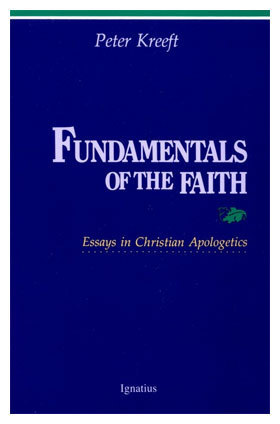 the truth; not that it is a
the truth; not that it is a
false religion but that it is only a religion. The world is a
big place, the objector reasons; “different strokes for different
folks”. How insufferably narrow-minded to claim that Christianity is the
one true religion! God just has to be more open-minded than that.
This is the single most common objection to the Faith today, for
“today” worships not God but equality. It fears being right where others
are wrong more than it fears being wrong. It worships democracy and
resents the fact that God is an absolute monarch. It has changed the
meaning of the word honor from being respected because you are superior
in some way to being accepted because you are not superior in any way
but just like us. The one unanswerable insult, the absolutely worst name
you can possibly call a person in today’s society, is “fanatic”,
especially “religious fanatic”. If you confess at a fashionable cocktail
party that you are plotting to overthrow the government, or that you
are a PLO terrorist or a KGB spy, or that you molest porcupines or bite
bats’ heads off, you will soon attract a buzzing, fascinated,
sympathetic circle of listeners. But if you confess that you believe
that Jesus is the Christ, the Son of the living God, you will find
yourself suddenly alone, with a distinct chill in the air.
Here are twelve of the commonest forms of this objection, the odium of elitism, with answers to each.
1. “All religions are the same, deep down.”
That is simply factually untrue. No one ever makes this claim unless
he is (1) abysmally ignorant of what the different religions of the
world actually teach or (2) intellectually irresponsible in
understanding these teachings in the vaguest and woolliest way or (3)
morally irresponsible in being indifferent to them. The objector’s
implicit assumption is that the distinctive teachings of the world’s
religions are unimportant, that the essential business of religion is
not truth but something else: transformation of consciousness or sharing
and caring or culture and comfort or something of that sort—not
conversion but conversation. Christianity teaches many things no other
religion teaches, and some of them directly contradict those others. If
Christianity isn’t true, why be a Christian?
By Catholic standards, the religions of the world can be ranked by how much truth they teach.
Catholicism is first, with Orthodoxy equal except for the one issue of papal authority.
Then comes Protestantism and any “separated brethren” who keep the Christian essentials as found in Scripture.
Third comes traditional Judaism, which worships the same God but not via Christ.
Fourth is Islam, greatest of the theistic heresies.
Fifth, Hinduism, a mystical pantheism;
Sixth, Buddhism, a pantheism without a theos;
Seventh, modern Judaism, Unitarianism, Confucianism, Modernism, and
secular humanism, none of which have either mysticism or supernatural
religion but only ethics;
Eighth, idolarity; and
Ninth, Satanism.
To collapse these nine levels is like thinking the earth is flat.
2. “But the essence of religion is the same at any rate: all religions agree at least in being religious.
What is this essence of religion anyway? I challenge anyone to define
it broadly enough to include Confucianism, Buddhism, and modern Reform
Judaism but narrowly enough to exclude Platonism, atheistic Marxism, and
Nazism.
The unproved and unprovable assumption of this second objection is
that the essence of religion is a kind of lowest common denominator or
common factor. Perhaps the common factor is a weak and watery thing
rather than an essential thing. Perhaps it does not exist at all. No one
has ever produced it.
3. “But if you compare the Sermon on the Mount, Buddha’s Dhammapada, Lao-tzu’s Tao-te-ching, Confucius’ Analects, the Bhagavad Gita, the Proverbs of Solomon, and the Dialogues of Plato, you willfind it: a real, profound, and strong agreement.”
Yes, but this is ethics, not religion. The objector is assuming that
the essence of religion is ethics. It is not. Everyone has an ethic, not
everyone has a religion. Tell an atheist that ethics equals religion.
He will be rightly insulted, for you would be calling him either
religious if he is ethical, or unethical because he is nonreligious.
Ethics maybe the first step in religion but it is not the last. As C.S.
Lewis says, “The road to the Promised Land runs past Mount Sinai.”
4. “Speaking of mountains reminds me of my favorite analogy.
Many roads lead up the single mountain of religion to God at the top. It
is provincial, narrow-minded, and blind to deny the validity of other
roads than yours.”
The unproved assumption of this very common mountain analogy is that
the roads go up, not down; that man makes the roads, not God; that
religion is man’s search for God, not God’s search for man. C. S. Lewis
says this sounds like “the mouse’s search for the cat”.
Christianity is not a system of man’s search for God but a story of
God’s search for man. True religion is not like a cloud of incense
wafting up from special spirits into the nostrils of a waiting God, but
like a Father’s hand thrust downward to rescue the fallen. Throughout
the Bible, man-made religion fails. There is no human way up the
mountain, only a divine way down. “No man has seen God at any time. The
only begotten Son who is in the bosom of the Father, he has made him
known.”
If we made the roads, it would indeed be arrogant to claim that any
one road is the only valid one, for all human things are equal, at least
in all being human, finite, and mixtures of good and bad. If we made
the roads, it would be as stupid to absolutize one of them as to
absolutize one art form, one political system, or one way of skinning a
cat. But if God made the road, we must find out whether he made many or
one. If he made only one, then the shoe is on the other foot: it is
humility, not arrogance, to accept this one road from God, and it is
arrogance, not humility, to insist that our manmade roads are as good as
God’s God-made one.
But which assumption is true? Even if the pluralistic one is true,
not all religions are equal, for then one religion is worse and more
arrogant than all others, for it centers on one who claimed, “I am the
Way, the Truth, and the Life; no man can come to the Father but by me.”
5. “Still, it fosters religious imperialism to insist that your way is the only way. You’re on a power trip.”
No, we believe it not because we want to, because we are
imperialistic, or because we invented it, but because Christ taught it.
It isn’t our way, it’s his way, that’s the only way. We’re just being
faithful to him and to what he said. The objector’s assumption is that
we can make religion whatever we want it to
6. “If the one-way doctrine comes from Christ, not from you, then he must have been arrogant.”
How ironic to think Jesus is arrogant! No sin excited his anger more
than the arrogance and bigotry of religious leaders. No man was ever
more merciful, meek, loving, and compassionate.
The objector is always assuming the thing to be proved: that Christ
is just one among many religious founders, human teachers. But he
claimed to be the Way, the Truth, and the Life; if that claim is not
true, he is not one among many religious sages but one among many
lunatics. If the claim is true, then again he is not one among many
religious sages, but the Way, the Truth, and the Life.
7. “Do you want to revive the Inquisition? Don’t you value
religious tolerance? Do you object to giving other religions equal
rights?”
The Inquisition failed to distinguish the heresy from the heretic and
tried to eliminate both by force or fire. The objector makes the same
mistake in reverse: he refuses to condemn either. The state has no
business defining and condemning heresy, of course, but the believer
must do it-if not through the Church, then by himself. For to believe x
is to condemn non-x as false. If you don’t believe non-x is false, then
you don’t really believe x is true.
8. “I’m surprised at this intolerance. I thought Christianity was the religion of love.”
It is. It is also the religion of truth. The objector is separating
two divine attributes. We are not. We are “speaking the truth in love”.
9. “But all God expects of us is sincerity.”
How do you know what God expects of us? Have you listened to God’s
revelation? Isn’t it dangerous to assume without question or doubt that
God must do exactly what you would do if you were God? Suppose sincerity
were not enough; suppose truth was needed too. Is that unthinkable? In
every other area of life we need truth. Is sincerity enough for a
surgeon? An explorer? Don’t we need accurate road maps of reality?
The objector’s implicit assumption here is that there is no objective
truth in religion, only subjective sincerity, so that no one can ever
be both sincere and wrong; that the spirit does not have objective roads
like the body and the mind, which lead to distinct destinations: the
body’s physical roads lead to different cities and the mind’s logical
roads lead to different conclusions. True sincerity wants to know the
truth.
10. “Are non-Christians all damned then?”
No. Father Feeny was excommunicated by the Catholic Church for
teaching that “outside the Church, no salvation” meant outside the
visible Church. God does not punish pagans unjustly. He does not punish
them for not believing in a Jesus they never heard of, through no fault
of their own (invincible ignorance). But God, who is just, punishes them
for sinning against the God they do know through nature and conscience
(see Rom 1-2). There are no innocent pagans, and there are no innocent
Christians either. All have sinned against God and against conscience.
All need a Savior. Christ is the Savior.
11. “But surely there’s a little good in the worst of us and a
little bad in the best of us. There’s good and bad everywhere, inside
the Church and outside.”
True. What follows from that fact? That we need no Savior? That there
are many Saviors? That contradictory religions can all be true? That
none is true? None of these implied conclusions has the remotest logical
connection with the admitted premise.
There is a little good in the worst of us, but there’s also a little
bad in the best of us; more, there’s sin, separation from God, in all of
us; and the best of us, the saints, are the first to admit it. The
universal sin Saint Paul pinpoints in Romans 1:18 is to suppress the
truth. We all sin against the truth we know and refuse it when it
condemns us or threatens our self-sufficiency or complacency. We all
rationalize. Our duty is plain to us—to be totally honest—and none of us
does his duty perfectly. We have no excuse of invincible ignorance.
12. “But isn’t God unjust to judge the whole world by Christian standards?”
God judges justly. “All who sinned without [knowing] the [Mosaic] law
will also perish without the law, and all who have sinned under the law
will be judged by the law” (Rom 2:12). Even pagans show “that what the
law requires is written on their hearts” (Rom 2:15). If we honestly
consult our hearts, we will find two truths: that we know what we ought
to do and be, and that we fail to do and be that.
Fundamentalists, faithful to the clear one-way teaching of Christ,
often conclude from this that pagans, Buddhists, et cetera, cannot be
saved. Liberals, who emphasize God’s mercy, cannot bring themselves to
believe that the mass of men are doomed to hell, and they ignore, deny,
nuance, or water down Christ’s own claims to uniqueness. The Church has
found a third way, implied in the New Testament texts. On the one hand,
no one can be saved except through Christ. On the other hand, Christ is
not only the incarnate Jewish man but also the eternal, preexistent word
of God, “which enlightens every man who comes into the world” (Jn 1:9).
So Socrates was able to know Christ as word of God, as eternal Truth;
and if the fundamental option of his deepest heart was to reach out to
him as Truth, in faith and hope and love, however imperfectly known this
Christ was to Socrates, Socrates could have been saved by Christ too.
We are not saved by knowledge but by faith. Scripture nowhere says how
explicit the intellectual content of faith has to be. But it does
clearly say who the one Savior is.
The Second Vatican Council took a position on comparative religions
that distinguished Catholicism from both Modernist relativism and
Fundamentalist exclusivism. It taught that on the one hand there is much
deep wisdom and value in other religions and that the Christian should
respect them and learn from them. But, on the other hand, the claims of
Christ and his Church can never be lessened, compromised, or
relativized. We may add to our religious education by studying other
religions but never subtract from it.

Peter Kreeft, Ph.D., is a professor
of philosophy at Boston College who has written over forty books, including C.S.
Lewis for the Third Millennium, Fundamentals
of the Faith, Catholic
Christianity, Back
to Virtue, Three
Approaches to Abortion , and The
Philosophy of Tolkien .
His most recent Ignatius Press books include Socrates
Meets Descartes , You
Can Understand the Bible , The
God Who Loves You , and Because God Is Real:
Sixteen Questions, One Answer .
A complete list of Ignatius Press books
by Kreeft can be viewed on his IgnatiusInsight.com
author page.)
Widows and Scribes, Substance and Style
Readings:
• 1 Kngs 17:10-16
• Ps 146:7, 8-9, 9-10
• Heb 9:24-28
• Mk 12:38-44
“Substance over style.” This phrase is a good reminder that
a culture filled with empty rhetoric, flashing lights, endless entertainment,
and the promise of bigger and better cannot satisfy our ultimate needs and
desires.
It also raises the question: What substance? How to identify
it? Today’s guide to the answer is the widow.
Widows are mentioned close to a hundred times in the Bible.
They have a special place, along with orphans, the fatherless, and the
oppressed, within the Law and the Prophets; they represent those who are
afflicted, vulnerable, and deserted. “You shall not afflict any widow or
orphan,” the Lord told the Israelites, “If you do afflict them, and they cry
out to me, I will surely hear their cry…” (Ex. 22:22-3). They were reminded
that Yahweh is “the great, the mighty, and the terrible God, who is not partial
and takes no bribe. He executes justice for the fatherless and the widow, and
loves the sojourner, giving him food and clothing” (Deut. 10:17-18).
The widow met by the prophet Elijah was not only destitute,
she was not an Israelite; Zarephath was a Phoenician town on the Mediterranean
coast. Seeking shelter and safety from King Ahab, Elijah had been told by the
Lord that the widow would be waiting for him (1 Kgs. 17:9). Both of them were
in desperate straits, abandoned and isolated from any sort of earthly support.
She, in fact, was resigned to death by starvation. But she did as the prophet
of God directed her. Even in the face of death, she was willing to listen to
voice of God, and so she and her son were blessed with a miraculous source of
flour and oil.
The scribes were experts in the Law whose theological judgments
carried great influence and authority. Jesus did not condemn them en masse, for in the passage prior to today’s Gospel reading
he told a scribe, “You are not far from the kingdom of God” (Mk. 12:34). Yet he
strongly criticized the conduct of many scribes, those who chose style over
substance. They were more concerned with looking good, getting attention, and
receiving honors than they were with the things of God and the plight of
widows.
Some of them “devoured the houses of widows,” likely a reference
to financial fleecing. Reliant on private donations, some scribes would say
prayers meant for human ears and not for God. Rather than pleading for the
widows (cf. Isa. 1:17), these scribes were taking advantage of them, something
condemned strongly by the Law and the prophets.
This sinful behavior, an injustice to the widows and a
denial of God’s commandments, is contrasted with the humility and trust of the
poor widow, who came to the Temple and “put in two small coins worth a few
cents.” Those coins were the smallest units of monetary currency, each worth
about 1/64 of a laborer’s daily wage. The monetary value was small, but it was
all that the widow possessed. She gave everything, “from her poverty … her
whole livelihood.”
The widow’s physical poverty was real, and she had little or
no control over it. But her spiritual poverty—that is, her humility and
devotion to God—was also real, and it was the result of her will and her
choosing. She embodied the first of the Beatitudes: “Blessed are the poor in
spirit, for theirs is the kingdom of heaven” (Matt. 5:3).
“She had given not out of her surplus, but out of her
substance,” notes Dr. Mary Healy in her commentary on The Gospel of Mark
(Catholic Commentary on Sacred Scripture, Baker, 2008), “Her gift meant that
she would have to rely on God even to provide her next meal. Such reckless
generosity parallels the self-emptying generosity of God himself, who did not
hold back from us even his beloved Son (Mk. 12:6).”
This sort of sacrificial giving and living is not, of
course, much in style. But serving God is not about style. It is about
substance.
(This "Opening the Word" column originally appeared in the November 8, 2009, edition of Our Sunday Visitor newspaper.)
Carl E. Olson's Blog
- Carl E. Olson's profile
- 20 followers



